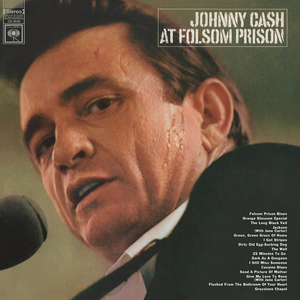
Johnny Cash at Folsom Prison is the first live album by American singer-songwriter Johnny Cash, released on Columbia Records on May 6, 1968. After his 1955 song "Folsom Prison Blues", Cash had been interested in recording a performance at a prison. His idea was put on hold until 1967, when personnel changes at Columbia Records put Bob Johnston in charge of producing Cash's material. Cash had recently controlled his drug abuse problems, and was looking to turn his career around after several years of limited commercial success. Backed by June Carter, Carl Perkins, and the Tennessee Three, Cash performed two shows at Folsom State Prison in California on January 13, 1968. The initial release of the album consists of fifteen songs from the first show and two from the second.
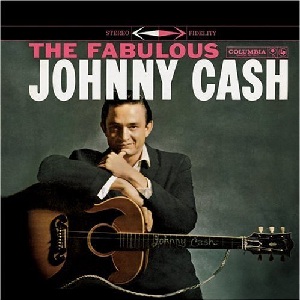
The Fabulous Johnny Cash is the second studio album by American country singer Johnny Cash and his first to be released by Columbia Records. The album was released on November 3, 1958, not long after Cash's departure from Sun Records.

Blood, Sweat and Tears is the fifteenth album by singer Johnny Cash, released on January 7, 1963. It is a collection of songs about the American working man. This includes "The Legend of John Henry's Hammer" and "Busted", the latter of which would become a single. Both would also be performed by Cash during his famous 1968 concerts at Folsom Prison and be included in the 1999 extended reissue of the album, At Folsom Prison. The album was included on the Bear Family Records box set Come Along and Ride This Train.

Look at Them Beans is the 52nd album by country singer Johnny Cash, released in 1975 on Columbia Records. Following an unsuccessful attempt with the previous album, John R. Cash to update Cash's sound with a new set of session musicians, Look at Them Beans reinstated The Tennessee Three as Cash's core session group.

The song "Ring of Fire" was made popular by Johnny Cash after it appeared on his 1963 compilation album Ring of Fire: The Best of Johnny Cash. Written by Cash's eventual second wife, June Carter Cash, and songwriter Merle Kilgore, "(Love's) Ring of Fire" was originally recorded by June's sister, Anita Carter, on her 1962 album, Folk Songs Old and New.
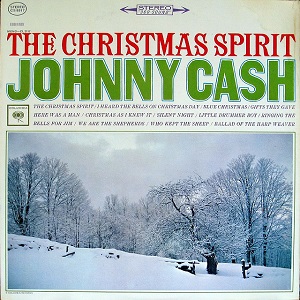
The Christmas Spirit is the first Christmas album and seventeenth album by country singer Johnny Cash, released on Columbia Records in November 1963. It contains four original Christmas songs written by Cash and eight tracks originally written by other artists, including "Blue Christmas", "Silent Night" and "Little Drummer Boy".

I Walk the Line is the nineteenth studio album by singer and songwriter Johnny Cash, featuring a handful of recent songs alongside new recordings of previous hits throughout his career up to that point. It was released on Columbia Records in 1964. The album was certified Gold by the RIAA in 1967.

Johnny Cash Sings the Ballads of the True West is a concept double album and the 22nd overall album released by country singer Johnny Cash, released on Columbia Records in 1965. Covering twenty individual songs, the album, as its title suggests, contains various ballads and other songs on topics related to the history of the American Old West. This includes Carl Perkins' "The Ballad of Boot Hill", "Streets of Laredo", and the sole single from the album, "Mr. Garfield", describing the shock of the population after the assassination of President James Garfield. One of the songs, "25 Minutes to Go", would later be performed at Folsom Prison and appear on Cash's famous At Folsom Prison recording in 1968, while the melody of "Streets of Laredo" would be recycled for the song "The Walls of a Prison" featured on Cash's album From Sea to Shining Sea.
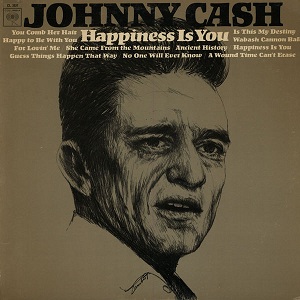
Happiness Is You is the 24th album by country singer Johnny Cash, released on Columbia Records in 1966. It contains, among others, "Guess Things Happen That Way", a re-recording of one of Cash's earliest Sun songs. The record reached #10 on the Country charts. The LP was originally to be titled "That's What You Get For Lovin' Me", taking its title from the Gordon Lightfoot tune included in the album, and promo copies and some early commercial pressings show this title on the label.

Old Golden Throat is the 28th album by country singer Johnny Cash. It was released in 1968 and is a collection of mostly previously released songs. Nine of the fourteen tracks had previously appeared on Billboard's country singles chart.

Hello, I'm Johnny Cash is the 33rd album by American country singer Johnny Cash, released on Columbia Records in 1970. "If I Were a Carpenter", a famous duet with Cash's wife, June Carter Cash, earned the couple a Grammy Award for Best Country Performance by a Duo or Group with Vocal in 1971 ; the song also reached #2 on the Country charts. This album also includes "To Beat the Devil", the first Kris Kristofferson song covered by Cash; the two would later collaborate numerous times, most famously on "Sunday Mornin' Comin' Down". "See Ruby Fall" and "Blistered" were also released as singles, and the album itself reached #1 on the country charts and No. 6 on the pop charts. It was certified Gold on January 29, 1970 the RIAA. The album has been released on CD and it has been made available on official download sites. This album is not to be confused with a 1977 Columbia Special Products compilation LP with the same name.

Man in Black is the 38th overall album by country singer Johnny Cash, released on Columbia Records in 1971. Many of the songs on the album contain political references, either broad or specific, while the title song refers both to Cash's tendency to wear black at live shows and to the tumultuous times in which the song was created, implying the Vietnam War. The album's name also eventually became Cash's informal nickname, given to him by the public. Two tracks — "Man in Black" and "Singin' in Vietnam Talkin' Blues" — were released as singles, the former peaking at No. 3 on the Country chart. The first track features Billy Graham.

The Mystery of Life is the 77th album by country singer Johnny Cash, released in 1991, and his last for Mercury Records. The songs featured are culled from both recent sessions and from leftovers from Cash's first Mercury session in 1986 for the album Johnny Cash is Coming to Town.
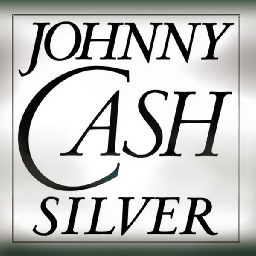
Silver is the 25th anniversary studio album by American country singer Johnny Cash, released on Columbia Records in 1979. It peaked at #28 on the Billboard albums chart. "(Ghost) Riders in the Sky" peaked at #2 on the singles chart; the two other singles, "Bull Rider" and "I'll Say It's True", had reached #66 and #42, respectively. Recordings of "Cocaine Blues" had previously appeared on At Folsom Prison and Now, There Was a Song!, under the title "Transfusion Blues" on the latter. The album was produced by Brian Ahern, who controversially introduced digital elements into the songs to the disapproval of some listeners. This is the last album that featured bassist Marshall Grant, longtime Cash collaborator in Tennessee Two. He departed from Cash's band the following year.

Gone Girl is an album by American country singer Johnny Cash, released on Columbia Records in 1978. It features the Rolling Stones' Beggars Banquet song "No Expectations", the original "It Comes and Goes" and Rodney Crowell's "A Song for the Life", as well as a version of Kenny Rogers' famous single "The Gambler", released just a month before Gone Girl. Three singles from the album, "Gone Girl", "I Will Rock and Roll with You" and "It'll Be Her", were released, but did not reach the country chart's top 20.
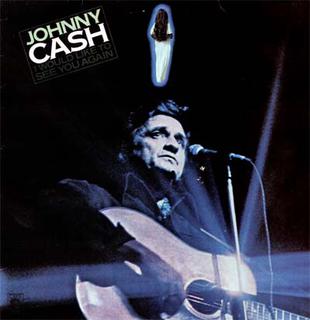
I Would Like to See You Again is an album by American country singer Johnny Cash, released on Columbia Records in 1978. The title track peaked at #12 on the singles chart, while "There Ain't No Good Chain Gang" reached #2; the album itself peaked at #23. The album features a pair of duets with Waylon Jennings, one of which was the "There Ain't No Good Chain Gang" single; it was one of Cash's first collaborations with Jennings, and the two recorded songs together throughout the 1980s, including a separate album entitled Heroes. Cash and Jennings would also work together as The Highwaymen with Willie Nelson and Kris Kristofferson.

The Last Gunfighter Ballad is an album by American country singer Johnny Cash, released on Columbia Records in 1977. Notable tracks include the title track, "Far Side Banks of Jordan" and "That Silver Haired Daddy of Mine", the latter of which features Cash's brother Tommy Cash. The title track was the album's only single, reaching #38 on the country charts; it tells the tale of an aging gunslinger who finds himself unable to deal with the modern way of life.

One Piece at a Time is the 54th album by American country singer Johnny Cash, released in 1976 on Columbia Records. "One Piece at a Time," which was a #1 hit, is a humorous tale of an auto worker on the Detroit assembly line who puts together a car out of parts he swipes from the plant. "Sold Out of Flag Poles" also charted as a single, reaching #29 on the country singles charts. "Committed to Parkview", a Cash original, would be re-recorded in 1985 by Cash, Waylon Jennings, Kris Kristofferson and Willie Nelson, collectively known as The Highwaymen, on their first album, Highwayman; it is one of the few country songs sung from the perspective of a patient at a mental hospital.

The Legend is a box set by country singer Johnny Cash, released in 2005 on Columbia Records and Legacy Recordings. It is one of the few multi-disc sets that contain songs recorded throughout Cash's entire career, from 1955 to 2003. Over four CDs, most of Cash's biggest hits are covered, in addition to numerous traditional compositions Cash recorded versions of, and several collaborations with other known artists, including Rosanne Cash, U2 and Bob Dylan. In keeping with Cash's persona as the Man in Black, the data surface of the discs is black. In 2006, the set won the Grammy Award for Best Boxed or Special Limited Edition Package. It was certified Gold on January 11, 2006, by the RIAA.

Johnny Cash Sings the Songs That Made Him Famous is a compilation album by American singer-songwriter Johnny Cash, originally released on December 1, 1958 by Sun Records. The album is made up of songs Cash recorded for Sun prior to leaving the label for Columbia Records. The album was re-issued in 2003, under the label Varèse Sarabande, with four different versions of songs already available on the original LP as bonus tracks. The complete contents of the album are also incorporated into an extended version of the previous collection With His Hot and Blue Guitar included in the 2012 box set Johnny Cash: The Complete Columbia Album Collection. In 2017 and again in 2023, Sun released a remastered version of the album




















